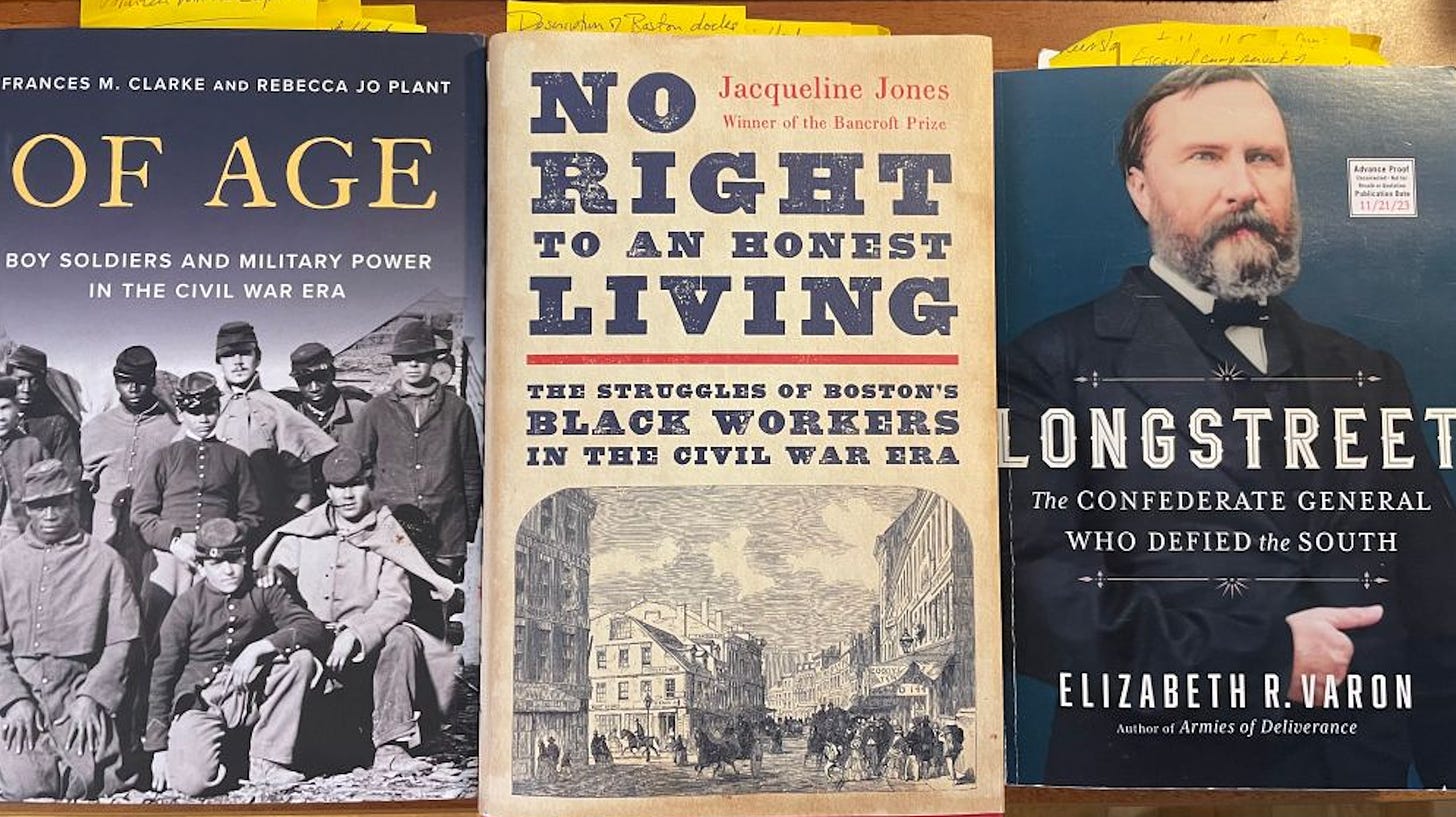Civil War Movie Discussion
Mark your calendars. On Sunday, November 19 at 7PM EST I will be hosting a zoom discussion about the 30th anniversary of Ronald Maxwell’s movie GETTYSBURG for all paid subscribers. Find some time to watch it and come with your questions and comments. This is going to be a lot of fun.
I will email a zoom link to all paid subscribers a few days in advance of the event.
Thanks to Civil War Monitor magazine editor Terry Johnston for once again giving me the opportunity to share a few of my favorite Civil War books of 2023. This most recent issue also includes the selections of historians Cecily Zander, Brian Matthew Jordan, Gerald Prokopowicz, and Jennifer Murray. This is always a challenge as I read a great deal throughout the year and there are plenty of books that could easily have made this short list.
Top Pick
It’s not every day that new study of the Civil War can be labeled “groundbreaking,” but in the case of Frances M. Clarke and Rebecca Jo Plant’s Of Age: Boy Soldiers and Military Power in the Civil War Era (Oxford University Press), the label is appropriate. Of Age challenges much of what we have long believed about underage soldiers who served in the Union and Confederate armies. Our understanding of these young soldiers is shrouded in stories of boys coming of age in the midst of war, facing the challenges of camp life and the enemy on countless battlefields, only to be cut down even before their prime.
While historians have long maintained that a relatively small number of underage men served, Clarke and Plant conclude that they made up about 10%—roughly 180,000 on the Union side and 20,000 on the Confederate side—of the armies’ volunteers beginning in 1861. Their service, the author’s argue, “represented the final stage of a process of politicization and militarization that had begun months if not years before.
The most interesting and arguably the most important chapters in this deeply researched study center on the conflicts between parents and the federal government over children who enlisted without parental consent. Even with the disparity between the populations of the United States and the Confederacy, it was the former that went further in resisting the attempts of parents, often through the use of habeus corpus petitions, to win the discharge of their underage children. That conflict was just one of the war’s underlying struggles over the centralization of legal and military power.
Of Age does more than shed light on the experiences of boy soldiers during the Civil War. It demonstrates how the war challenged deep-rooted assumptions about the innocence of youth, military service, the reach of federal power, and the impact of violence on society. This book is a must read.
Honorable Mention
The memory of Civil War-era Boston is dominated by stories of black and white abolitionists and the eventual organization of the 54th Massachusetts Infantry in 1863. But in No Right To An Honest Living: The Struggles of Boston’s Black Workers in the Civil War Era (Basic Books), historian Jacqueline Jones explores the struggles of the city’s laboring class. Before the war black Bostonians campaigned to desegregate schools and streetcars in addition to calling for the end of slavery. Jones does an excellent job of highlighting the limits of white abolitionists and Brahmin support for improved conditions of the city’s black workforce. In doing so, she anticipates some of the challenges faced in convincing a sufficient number of Boston’s military-age black men to enlist in 1863. By extending the story into the postwar years, Jones demonstrates how military service translated into continued calls for the full rights of citizenship in Massachusetts and throughout the nation.
Looking Forward To
I’ve been looking forward to Elizabeth Varon’s Longstreet: The Confederate General Who Defied the South (Simon & Schuster) for years, and though it is scheduled for a late November publication, I have read through most of an advance copy. [I have now had a chance to read the book in its entirety.] While Jeffry Wert’s 1993 biography of Lonstreet offered a detailed overview of the Confederate general’s military career, Varon focuses mainly on his postwar political trajectory. Longstreet’s story is an important reminder that interracial alliances were possible after the war and that the era of Jim Crow was not inevitable.
All Civil War researchers use it, but how many of us have ever wondered how The War of the Rebellion: The Official Records of the Union and the Confederate Armies was created? I hope to gain a better understanding about how the selection process and organization have helped to shape myths, hide truth, and encourage reconciliation, in Yael A. Sternhell’s War on Record: The Archive and the Afterlife of The Civil War (Yale University Press). [I’ve now had a chance to read about half of this book and I highly recommend it.]
I noticed what all of these authors have in common only after I completed my selections. That’s a very good sign for the future of Civil War studies.





Thank you for this and I ordered it. It sounds perfect for the classroom!
Have you seen Ronald White's On Great Fields: The Life and Unlikely Heroism of Joshua Lawrence Chamberlain? I saw him speak at Bowdoin the other day and the book looks terrific.